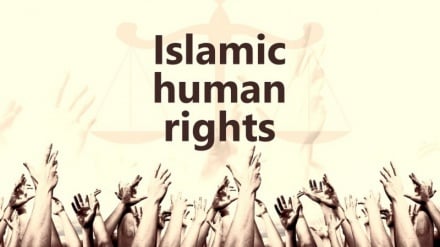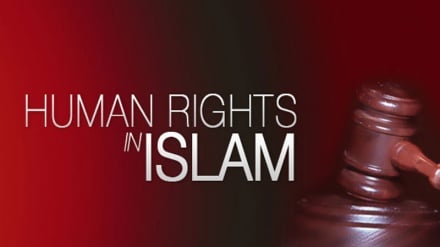Islamic Human Rights (22)
Welcome to the 22nd weekly episode of the series Islamic Human Rights. In this episode, we study the topic of human dignity from the viewpoint of Islamic human rights.
Previously, we spoke of the right of existence as the first human right. It was also mentioned that the Islamic legal system considers material and spiritual existence for every individual. Material existence is related to human body, and spiritual existence is related to man’s spirit and soul. God has bestowed the right of existence to mankind so that he would be able to make the best of his life and to try to maintain his spiritual and physical existence. Protection of this divine gift is the duty of every human being. However, spiritual existence is within a higher level compared to material existence and the sacred religion of Islam focuses on the spiritual aspect of man’s life. No school of thought has focused on spiritual existence as much as the divine religions, especially to the extent of sacred religion of Islam. None of human right documents mention the spiritual existence of mankind, because such documents are rooted in the materialistic thoughts of Western thinkers and are restricted to the period of physical existence in the material world.
In accordance to the view of divine religions, human life is not limited to the physical life in the material world, because human soul is important and eternal. Life doesn’t end upon death. Hence, the spiritual life is closely bonded to human spirit, which maintains an innate divine nature. All of us are responsible toward our souls and spirits and there are dangers that pose a threat to our spiritual existence. The main manifestation of spiritual death is man’s deviation from the right path. One of the main psychological scars which can be inflicted on man’s spirit is the development of deviated and derailed ideas and promotion of ugly deeds and social corruptions.
In divine religions, the right of existence is sacred. Obviously, no individual can deal with his material and spiritual existence as he wishes. However, when existence becomes sacred, mankind is after implementation of divine values in his life. In this case, the individual feels responsible toward his own life and lives of others; even if he doesn’t maintain a personal interest in these domains. Thus, he does everything he can to revive mankind and to maintain others’ dignity and honor, because human life is respected and human innate nature and spirit is dignified.
One of the topics of importance in the fields of law, philosophy, and ethics is human dignity, because it forms the basis of many human rights, benefits, and obligations.
In human right documents, the concept of human rights is an innate value which forms the basis of all human rights. All human beings, irrespective of their social position and status such as gender, race, physical, and spiritual conditions maintain and enjoy human dignity. In all human right documents, human dignity and honor has been taken into consideration. Thus, within the text and/or prelude of documents such as the UN Charter, the Universal Declaration of Human Rights, and many other human right conventions, the topic of human dignity and honor has been mentioned.
The UN Charter has stated the UN Charter member states have announced their faith in the fundamental human rights and the value of human beings in the prelude of this document and have encouraged respect for human rights and fundamental freedoms for all in the 3rd clause of the first article.
In the prelude to Universal Declaration of Human Rights and its first article, the innate honor and dignity of the entire human community and their equal rights have been identified. This declaration has especially focused on human dignity and states that human dignity is the right of all members of human community and is considered as a basis for global justice, freedom, and peace.
Many thinkers consider the existence of mankind valuable and respectable. Hence, human right rules and regulations should approve of human dignity and honor.
A brief glance at the teachings of Abrahamic religions shows the focus of these religions on the honor of mankind. Human honor and dignity is a divine gift bestowed on mankind in the view of sacred religion of Islam.
Meanwhile, the 70th ayah of Surat al-Isra in Holy Quran notes: “Certainly We have honored the Children of Adam, and carried them over land and sea, and provided them with all the good things, and given them an advantage over many of those We have created with a complete preference.”
This honor and dignity maintains a logical background and is rooted in the spiritual aspect of mankind because honor and dignity is a God-given gift to mankind. In the view of the divine religion of Islam, this advantage and honor is rooted within the especial creation of man, which is blended with the breathing of the divine spirit into mankind.
The 72nd ayah of Surat Sad in Holy Quran notes: “So when I have proportioned him and breathed into him of My spirit, then fall down in prostration before him.”
Honor and dignity is a divine gift which only belongs to mankind in the view of Holy Quran, and no other creature has been described with such honor and dignity.
God in the 12th to 14th ayahs of Surat al-Mu’minun in Holy Quran notes: “Certainly We created man from an extract of clay. Then We made him of a drop of seminal fluid lodged in a secure abode. Then We created the drop of fluid as a clinging mass. Then We created the clinging mass as a fleshy tissue. Then We created the fleshy tissue as bones. Then We clothed the bones with flesh. Then We produced him as yet another creature.
So blessed is Allah, the best of creators!”
So, the source of human dignity is the divine soul which God has bestowed on mankind.
In the view of Islam, all human beings, including Muslims, non-Muslims, and even wrongdoers, maintain human dignity, which goes to show the in-depth and profound stance of Islam toward human dignity and honor. Many hadiths which have been cited from the Prophet of Islam’s Infallible Household have put emphasis on maintenance of honor, reputation, and dignity of the entire mankind. In the view of Islam, there is no difference between Muslims and non-Muslims in relation to their social and civil rights.
We came to realize that all human beings maintain honor and dignity. This right has been emphasized in human right documents and has been taken into consideration for centuries in the teachings of divine religions, such as the sacred religion of Islam. Human honor is the source of all human rights. In this regard, there is no difference between Islam and the contemporary human rights. However, Islam refers to another aspect of human dignity which has been neglected to this date by Western and human rights thinkers. Next week, we study the second aspect of human honor and dignity.
MR/MG


